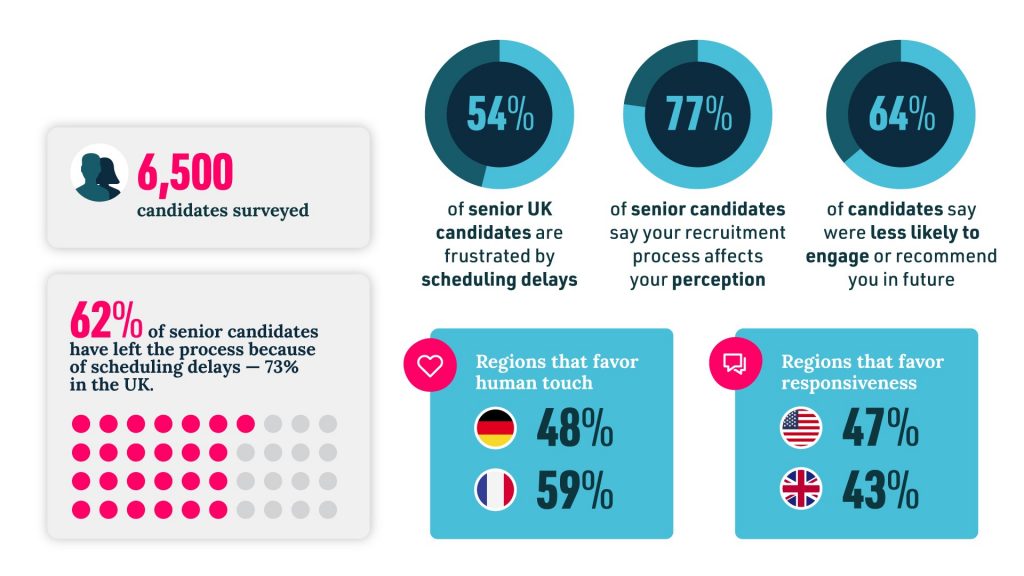Discover the implications to your business and hiring funnels of inefficient interview scheduling through real candidate insights and data.
Consider what candidates really want in the hiring process and match your strategies and objectives to these expectations.
Understand how technology and automation can offer a human-led but software-enabled advantage in the competition for talent.




In an extreme job economy where the difficulty in finding, attracting, onboarding, and retaining top talent is incredibly intense, hiring and recruitment teams need to understand where the inefficiencies in their processes are, to prevent precious candidates from falling out of the funnel.
We partnered with Cronofy to deliver a webinar, exploring what strategies and technologies are available to remove the pain points and create a more successful talent strategy – and better business outcomes. Find out what was discussed with our expert panelists, and watch the webinar on-demand now!
In a survey released by Cronofy, they discovered that for every HR professional they spoke to, interview scheduling was a source of friction. What’s more, 62% of 6,500 senior candidates surveyed told Cronofy that they’d left the hiring process because of scheduling delays (73% in the UK).
Adam Bird, CEO, and Co-Founder at Cronofy opened the session by presenting some astounding statistics from their in-depth and vast survey, some of which you can see here:

Top findings from Cronofy’s study on the true impact of interview scheduling on hiring
The survey clearly unveils there could be some easy wins for recruiters, especially in an increasingly competitive hiring landscape, as businesses need to stand out and get ahead to hire the best talent. Adam shared with the audience that offering higher salaries and more perks isn’t always sustainable. But, as defended by the data in their report, improving the recruitment process and hiring faster than the competition is key.
It appears that currently, recruiters are not providing the exceptional service that provides speed, responsiveness, and a human touch to keep candidates in the process and to convert, according to the findings.
Recruiters are ‘people’ people and we should be giving them the chance to do that people stuff – to talk to candidates, to understand candidates, to share the proposition, to get under the skin of the candidate to see if they’re a good fit for the organization. Admin is not good use of their time.
Adam Bird, CEO and Co-Founder, Cronofy
For this session, we were lucky enough to have Steve Usher, Founder of 5ive Studio, join us. He provided a unique perspective, fusing the worlds of experience design and a background in recruitment. Throughout the webinar, he added weight from his own work that the experience of the candidate must come first in the recruitment process, arguing that given the consumerization and expectation of certain levels of experience – ones that are slick and removed from any points of friction – the experience is going to be the differentiator for successful organizations.
Steve believes that organizations must now seize the opportunity of what the experience economy stands for and a requirement for HR leaders, and business leaders, to assign and understand the economic value of providing a good candidate experience (and the knock-on bettering of experiences for hiring managers and recruiters). By enabling a good experience and focusing on the moments that matter, he believes that time won’t just be saved, but time will be “well spent”, and organizations could easily engage more candidates than ever.
There’s lots of nuts and bolts as we know to a hiring process, but I think early doors, really setting out the hiring plan, the expectations, the time frame, the milestones is really crucial to this, and it’s a systemic problem I’m seeing in organizations at the moment.
Steve Usher, Founder, 5ive Studio
And, David Smith, Leader on People Engagement and Business Performance agreed with Steve. He reiterated the results from the survey that candidates are voting with their feet if they aren’t satisfied with the recruitment process but also alluded to recognizing the business implications of a bad hire. He considered that “If your process doesn’t work, then you’re committing suicide in such a tight talent market… If you’re losing candidates as a result of your process being sloppy, then that’s serious.”
The panelists clearly agreed that at a time when every candidate is valuable and the pressure is fierce, TA leaders can no longer afford the failings created by poor processes and poor technology choices.
The panelists also discussed that the recruitment experience isn’t just about the candidate and their perspective. David noted that there’s a mentality shift that needs to occur to be successful in understanding the pitfalls in the process and the moments that matter. He said that recruiters and hiring managers could switch up calling interviews as such, but instead call them discussions or a label that nods to the mutuality of what is happening – that it’s as much about assessing if the candidate is a good fit with the organization, as the candidate is assessing the organization.
Candidates shouldn’t want every job their offered and organizations shouldn’t want every candidate.
Adam Bird, CEO and Co-Founder, Cronofy
Steve continued on this track, stating that the authenticity and transparency you demonstrate in the candidate experience are crucial. This is the opportunity for the organization to demonstrate who they are and what they’re about, he said. And the linear approach to recruitment that has largely gone unchanged, isn’t the way to do it, in his eyes.
Mapping the key moments in the hiring journey, seeing what is successful and what’s not through things like NPS or verbatim comments, could be a way to talk the language of the business, to get to the root causes of what isn’t going right in the hiring process, and what could be improved, whilst getting buy-in from the organization’s leadership, Steve told the audience.
"*" indicates required fields
"*" indicates required fields
"*" indicates required fields